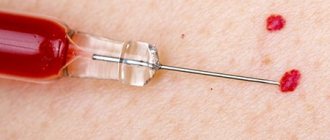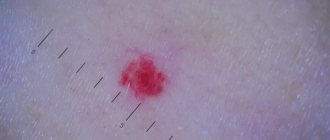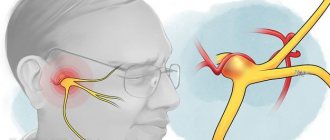A tingling sensation throughout the body is a sign of many vascular and neurological diseases. This is how endocrine pathologies can manifest themselves, for example, diabetes mellitus in an advanced stage, thyrotoxicosis, excess adrenal hormones, etc.
If you periodically experience tingling throughout your body like needles, we recommend that you consult a neurologist. With a high degree of probability, a malfunction in the autonomic nervous system will be detected. Then it will be necessary to identify the cause of such a disorder - what kind of disease led to damage to the structure of the nerve fiber. After making an accurate diagnosis, the doctor will be able to develop an effective and safe course of therapy.
It is very difficult to independently identify the cause of such a symptom, since the anatomy and physiology of the autonomic and central nervous systems are quite confusing and incomprehensible to a person without a medical education. Here are just some information that will help to better understand the mechanism of pathological manifestations:
- in the structures of the brain there are centers that analyze impulses coming from different parts of the body;
- The senses (touch, smell, vision, hearing, taste) are responsible for collecting information about the environment;
- the transmission of signals from the sense organs occurs through sensory types of axons; they enter the structure of the radicular nerve, which transmits the signal through the spinal cord and the surrounding cerebrospinal fluid to the cerebral centers;
- back through the spinal cord and radicular nerves, a response impulse passes through the motor (motor) network of nerve fibers, which commands the muscles to contract or unclench;
- in this way the work of the vascular bed, the entire muscular framework of the body, internal organs, the process of breathing and heartbeat is coordinated;
- even the secretion of gastric juice occurs in a similar way after the passage of a signal from the gastric mucosa about the arrival of a food bolus;
- with pathological changes in small sensory nerve endings located in the middle and deep layers of the skin, a person feels a tingling sensation (thus the autonomic nervous system signals about problems and pathological processes).
If you have tingling skin all over your body, you need to see a neurologist as soon as possible. Only a doctor, with the help of special examinations, can identify the exact cause of such a neurological symptom related to paresthesia.
Of course, cases of physiological tingling are possible. But, as a rule, it occurs in limited areas of the body. For example, if a person was in a forced uncomfortable position for a long time, in which his blood microcirculation processes were disrupted. Against the background of oxygen starvation, small nerve endings suffer from ischemia and give a tingling effect. Thus, the body signals about pathological changes that require immediate help. After changing the position of the body, all unpleasant sensations disappear within a few minutes, as soon as adequate nutrition of the nerve fiber is restored.
If tingling sensations are present simultaneously throughout the entire body, this may indicate that the pathology is developing in the structures of the brain or spinal cord. If the patient is not provided with timely medical care, brain damage or paralysis of the entire body may develop. There is also a high probability of death due to respiratory or cardiac arrest.
If you have tingling sensations in your body and you are in Moscow, you can make an appointment with a neurologist right now. In our manual therapy clinic, the initial appointment with a neurologist is completely free for all patients. During the consultation, the doctor conducts an examination and establishes a diagnosis, giving individual recommendations for further examination and treatment.
You can make an appointment for a free appointment with a neurologist using the special form located at the bottom of this page. You can also call the number provided and agree with the administrator on a convenient time for your visit.
What does tingling all over the body mean?
First, let's look at the question of what tingling throughout the body means and what this sensation indicates. So, tingling is a subjective sensation that is not manifested externally in any way. It may be accompanied by pale skin, goose bumps, or may remain without external manifestations. It all depends on the reason for the appearance of such a clinical sign.
As mentioned above, small sensory and motor nerve endings are present literally throughout the body. They penetrate all layers of skin, muscles, ligaments, tendons. Each nerve ending is connected to a small blood vessel (capillary). It provides uninterrupted nutrition to the nerve fiber.
If the blood supply is disrupted for one reason or another, a tingling sensation occurs, then aching. If emergency measures are not taken, the nerve fiber begins to die and the tingling sensation is replaced by numbness.
What does tingling throughout the body mean - this is a reaction of the autonomic nervous system in response to a violation of the blood supply or innervation. This condition can occur with various pathologies at the level of the brain and spinal cord, spinal column, nerve plexuses, radicular nerves, large, medium and small nerves responsible for the innervation of the body.
Tingling sensations throughout the body can occur against the background of poisoning, disruption of the endocrine system, and even with the development of acute viral or bacterial infections. We will analyze all possible reasons in more detail later in the article.
Treatment of numbness, burning, tingling sensations
The treatment for this case lasted for three months, after which all symptoms disappeared completely, numbness and tingling no longer appeared. My sleep has become high quality, there are no headaches or dizziness. The meaning of what was said is grasped immediately. It is recommended to contact immediately if your condition worsens. In addition, an annual inspection is required. The patient was observed by our doctor for 4 years and followed the recommendations in full. During this period, no deterioration of the condition was recorded.
As a rule, treatment in such situations is always justified by the reasons for the formation of these sensations, which are indicated in a complete and accurate diagnosis. Treatment is recommended to be carried out in an outpatient program using hospital-substitution methods. Treatment for sensations of numbness, burning, tingling should be active, using neurometabolic agents, methods of restorative therapy of the nervous system, psychotherapy, and possibly the use of physiotherapy. It is necessary to strictly follow the doctor’s recommendations regarding daily routine and diet.
If another stressful situation occurs during treatment, exacerbations may occur and the condition may worsen. However, inpatient treatment is usually not recommended for patients so that their nervous system is “trained” to respond correctly to such adverse external influences. This is the main goal of treatment - to prevent another nervous breakdown.
Inpatient treatment for symptoms of numbness, burning, and tingling can only be recommended if these manifestations are in the context of an acute mental state (psychosis).
Numbness, burning, and tingling sensations can be felt in various parts of the body
- sensation of numbness, burning, tingling in the scalp
- feeling of numbness, burning, tingling in the hand
- sensation of numbness, burning, tingling, tickling of the tongue
- feeling of numbness, burning, tingling in the legs
- numbness, burning, tingling sensation in the face
- sensation of numbness, burning, tingling in the fingers
- sensation of numbness, burning, tingling in the mouth
- sensation of numbness, burning, tingling, tickling in the throat
If you feel numbness or tingling sensations in various parts of the body for no apparent reason
You don’t need to undergo a lot of unnecessary tests
Call and make an appointment! Our treatment helps even with the most severe cases, when other treatments have not helped!
Reasons why tingling throughout the body
Why is there tingling all over the body? This question can only be answered by conducting a full examination of the patient. Based on additional clinical signs, an experienced neurologist will be able to exclude the possibility of a vascular accident, disruption of the passage of nerve impulses along the spinal cord, etc.
The main causes of tingling throughout the body include the following diseases and conditions:
- iron deficiency or B12 deficiency anemia - with an insufficient number of red blood cells, the body's cells experience oxygen starvation, which manifests itself in the form of unpleasant sensations;
- deficiency of certain minerals, for example, magnesium, leads to defective transmission of nerve impulses through a network of small nerve endings;
- insufficient amount of B vitamins - the function of the nerve fiber is impaired, it undergoes partial atrophy;
- spinal cord stenosis occurs (for example, when a dorsal hernia prolapses into the lumen of the spinal canal or when the vertebral bodies are displaced against the background of intervertebral disc protrusion);
- the blood supply to cerebral structures is disrupted (for example, with the development of posterior vertebral artery syndrome against the background of long-term osteochondrosis of the cervical spine);
- foci of ischemia develop in the structures of the brain against the background of atherosclerosis and other vascular pathologies;
- there is an emergency increase in blood pressure;
- A large amount of adrenaline, norepinephrine, cortisol and other stress hormones are released into the blood;
- Diabetic angiopathy and neuropathy develop against the background of a constant increase in blood sugar levels in uncontrolled diabetes mellitus.
There are several other possible causes of tingling throughout the body, like needles, and among them it is worth highlighting tumors, infections of the spinal cord and brain. Sometimes potential causes of tingling skin throughout the body are traumatic lesions of the structures of the spinal column. The risk group includes older people with developing osteoporosis. In them, even minor injuries can lead to a compression fracture of the vertebral column. This injury often causes the development of various neurological manifestations, including paresthesia throughout the body.
Only an experienced neurologist can determine exactly what causes tingling throughout the body. He may prescribe an EEG, MRI of the cervical spine and head, ultrasound of the vessels of the neck and head, X-rays, etc. Based on the results of all examinations, the doctor will make a diagnosis and prescribe adequate treatment. It is not recommended to take measures to combat this symptom on your own. This can lead to tragic consequences.
Diagnosis of numbness, burning, tingling sensations
If a person, at some point, begins to worry, his quality of life deteriorates, he begins to visit doctors of various specialties. And if doctors rule out somatic pathology, then an in-person joint consultation with a psychotherapist and a neurologist is necessary, since these sensations are more common with any disorders of the nervous system.
The sensation of numbness, burning, tingling in various parts of the body is a consequence of disruption of the autonomic nervous system. As a rule, such sensations are quite common in anxiety-neurotic syndromes complicated by autonomic reactions (disruption of higher nervous activity) and various neurological changes. At the biological level, the central nervous system gives the wrong impulse to the peripheral nervous system, and these unpleasant sensations appear, which destabilize the person’s mental state even more. The person begins to worry about what perpetuates this pathological reaction of the nervous system. It turns out to be a “vicious circle”.
Differential diagnosis
Also, numbness and tingling in various parts of the body can be a pathology of sensations in the form of so-called senestopathy. The unpleasant, painful, sometimes unusually painful affective tone of the sensations of senestopathies, as a rule, is consonant with an anxious-depressive mood. These sensations are long-lasting, occur in short bursts and are always difficult for people to bear.
It is very important to note that the occurrence of senestopathies is not associated with local disorders, which can be established by standard diagnostic research methods.
As a rule, at the onset of the disease, with manifestations of senestopathy syndrome, sensations most often have a certain localization and similarity to the manifestations of general somatic diseases. Subsequently, these sensations lose their strict localization, become diffuse, and acquire an unusual, and often pretentious, character.
The above disorders in the form of numbness or tingling in various parts of the body can be symptoms of various mental disorders, ranging from neurotic disorders to severe psychotic illnesses.
If we are talking about an anxiety-neurotic disorder (a breakdown of higher nervous activity), then, as a rule, neuroses are borderline mental states and, with adequate therapy, they are reversible and the prognosis is quite good.
To accurately determine the condition, you need the correct diagnostic basis and consultation with a psychotherapist, who, using the results of the examination, will be able to prescribe treatment; as a rule, complex therapy is needed here:
- medicinal, to restore the biological functions of the brain,
- psychotherapy in order to destroy pathological behavior patterns and recreate healthy ones.
Most often, patients with disruptions of higher nervous activity complain of numbness in the extremities, part of the head (especially the scalp), fingers and toes.
The tingling sensation most often occurs in a less localized area of the body and is described by patients, in most cases, as “tingling here and there.”
Example of patient complaints of tingling sensations and feelings of numbness
Such complaints are the most common in the practice of modern psychotherapists and neurologists.
Male, 35 years old. Married, has a prestigious job, no bad habits. I was examined by almost all doctors and got an appointment with a psychotherapist by accident.
For example, we specifically chose a case that does not have a somatic connotation in the form of the consequences of any diseases, for example, alcoholism, drug addiction, vascular changes, brain injuries, etc.
In this case, the manifestation of the patient’s complaints is based on a disruption of higher nervous activity as a result of high psychophysical stress, since these are the patients who make up the largest number among those seeking medical help with similar symptoms.
The patient had a large folder with him with various studies and test results. He came to the appointment accompanied by his wife, who insisted on his conversation with the doctor. His attitude towards the conversation with the psychotherapist is extremely negative.
“I came to you at the insistence of my wife, although I don’t understand how my goosebumps and lack of sensitivity in the back of my head can be related to psychiatry. I know for sure that I am mentally healthy and I have a certificate from a psychiatrist. I have a driver's license and I have a gun." ...
The patient could not calm down for a long time and did not want to have a constructive conversation with the psychotherapist. But, after some time, the doctor finally convinced him to complain about his condition and together figure out the reasons for the decline in his quality of life.
“It started when I began to feel a tingling and pinching sensation in my arm. At first I thought that I was sleeping incorrectly. Then it began to be felt more and spread to the neck and face. It feels like they are being pricked with small needles. It doesn't hurt, but it's very annoying and distracting. I went to the therapist, donated blood for lipids, coagulation, biochemistry, etc. and everything turned out to be normal, so he sent me to a neurologist.
The neurologist sent me first to an MRI, then to an EEG, CT, and ultrasound. Diagnosed with: polysegmental osteochondrosis, scoliosis, functional instability of the cervical spine, vertebral artery syndrome against the background of polysegmental osteochondrosis, Vertebrogenic dorsalgia, narrowing of the vertebral arteries with insufficiency of blood flow of 60%. He prescribed treatment, which I took for 8 months. The result, if you say that it is zero, then this is not true, because it got worse, which is also a result. During this time, the back of my head began to go numb, and goosebumps spread to my stomach. I quit treatment with this neurologist and went to another one. Another made his own diagnosis (transient ischemic cerebrovascular accident), and the result was the same, I went to another - compression of the left vertebral artery in the precranial segment with a local hemodynamic shift at the level of the Atlanta loop, stenosis less than 50%. Then to another, and another. In total, I visited six neurologists who diagnosed me and treated me, but nothing changed, except that the area of numbness on the back of my head grew, and I no longer felt half of my head, and I began to feel tingling sensations in different places.
I can’t even say where I haven’t felt these tingling and goosebumps. The location could change 2-3 times a day. I was treated by neurologists for more than 2 years.
Then they recommended me to a good cardiologist. And again there were various examinations, diagnoses and treatments: sugar was normal, microelements (magnesium, potassium, calcium) were also normal, vitamins were normal. ECG, 24-hour Holter monitoring, ultrasound, etc. His treatment was as useless as that of others.
I visited an endocrinologist, a nephrologist, and an ophthalmologist; I probably went through all the doctors, leaving only the gynecologist and you. I’m talking to you now. I have been going to doctors for four years now, but there is no improvement. I also saw a psychologist, but I just messed with my brain, but it was of no use. I was already tired of being treated, and none of the treatments helped me. Should I go to the gynecologist now?”
It was a story of treatment and torment of a man. The psychotherapist began to find out the circumstances and possible causes. We will present this story in the abstract.
“Yes, I remember, just before it all started, I was having serious difficulties at work. I had to work almost for days, with great nervous overload. It was not always possible to get enough sleep. That’s when I thought that I was sleeping in an uncomfortable position, and this was making my hand go numb. Then everything returned to normal, but these goosebumps sensations remained. I went to a neurologist, assuming it was nervous, but apparently I was wrong.
Now I am worried about dizziness, almost every day. Not strong, most often mild, a feeling of slight intoxication or slight unreality.
A little, in the evening, my head starts to hurt, it’s hard to focus. Sometimes my wife or child says something, but I cannot understand the meaning of what was said. I seem to understand what they said, but I don’t get the meaning.
Headache - in the form of a hoop, also not severe, appeared quite recently, more with pressure on the right and numbness of the head from behind, from the back of the head, right on half of the head.
From time to time I hear some noise in my ears, sometimes in the left ear, sometimes in the right ear (a week on the left, a week on the right). There is a tingling sensation all over the back, like needles. It feels as if I’ve been sitting or lying down, even though I’m not lying down.
My sleep is a little disturbed. I have trouble falling asleep, I constantly have thoughts, and I wake up before the alarm clock or can’t get up in the morning.
Yes, I get up in the morning without sleep, often during the day I feel exhausted and want to sleep.
We tried to do the massage ourselves, but after it the sensations of numbness and tingling intensified, it was better not to touch it.”
A slight tingling sensation throughout the body is a symptom of the disease.
Symptoms such as tingling throughout the body are classified as neurological. They indicate a disturbance in the conduction of a nerve impulse or incorrect processing of received information by brain structures. If such clinical signs appear, an urgent consultation with a neurologist is necessary.
Minor tingling throughout the body may be present during intoxication. In this case, toxins and tissue breakdown products enter the nerve endings along with the arterial blood flow. They negatively affect the nerve endings and the person feels an unpleasant tingling sensation throughout the body; when it appears against the background of elevated body temperature, measures should be taken to detoxify the body.
Also, tingling can be a symptom of damage to brain structures due to circulatory problems. With the development of ischemic stroke at an early stage, a volatile tingling sensation may occur in one half of the body. If, along with them, even a slight decrease in muscle strength is felt, a dilated pupil appears in one eye, or a violation of the symmetry of the facial muscles occurs, you should immediately seek medical help. In case of a stroke at an early stage, it is possible to provide emergency conservative care, after which the patient will not develop paralysis.
Treatment of nerve tingling throughout the body
Nervous tingling throughout the body is not an independent disease. This is a clinical symptom of various pathological changes in the human body. Therefore, treatment can begin only after an accurate diagnosis has been made. During the examination and examination, the doctor establishes the diagnosis and the reasons that led to the development of a particular disease. Then the patient is given individual recommendations. These may include:
- changing your diet to include all the necessary nutrients, minerals and vitamins;
- maintaining an active lifestyle with sufficient physical activity, since paresthesia can appear against the background of advanced cases of physical inactivity;
- proper organization of sleeping and working space;
- giving up bad habits, etc.
In our chiropractic clinic, severe tingling sensations throughout the body are treated only after a diagnosis has been made. If they are provoked by a dorsal intervertebral hernia, then measures are first taken to reduce the hernial protrusion of the nucleus pulposus and restore the integrity of the cartilaginous tissue of the intervertebral disc. Osteopathy and laser vaporization can be used for this. Then several sessions of manual traction of the spinal column are performed. The doctor may also prescribe massage, physiotherapy, therapeutic exercises, kinesiotherapy, reflexology, etc.
The course of treatment is always developed individually. Therefore, we recommend that you make an appointment for a free appointment with a neurologist at our manual therapy clinic. During the consultation, you will be given individual recommendations for examination and treatment.










